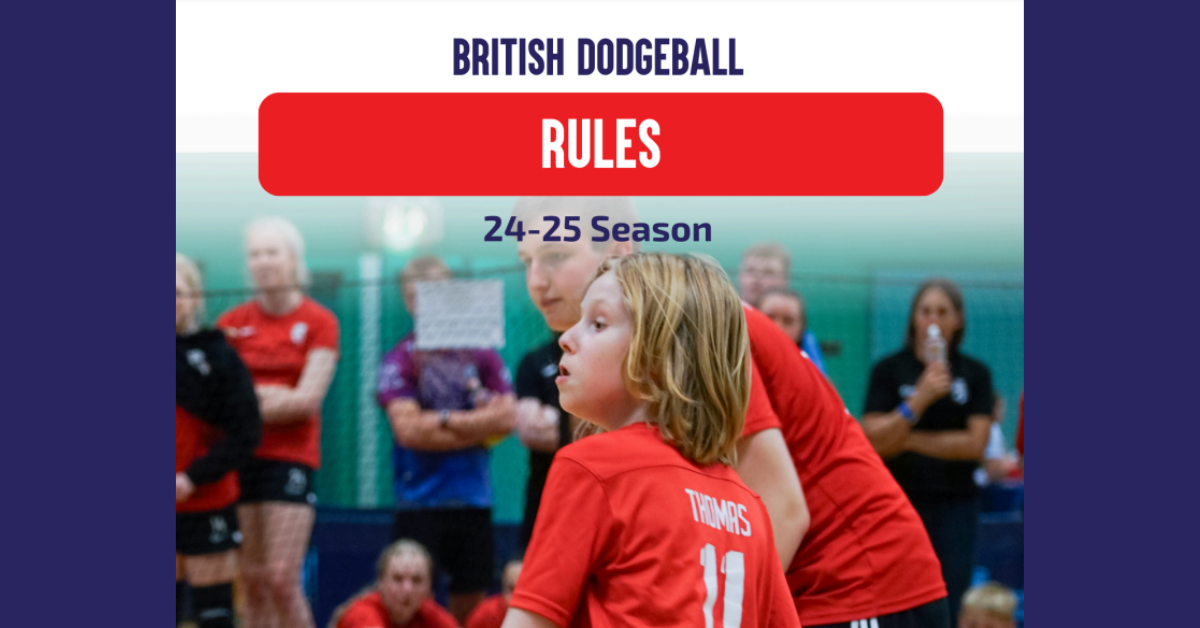The British Dodgeball Technical Committee is pleased to share the the newest iteration of the British Dodgeball Rules & Regulations. They can be viewed in full on the rules page here – please find a summary of changes below:
Summary of Rule Changes for the 24-25 Season and beyond (version 1.6):
- Burden attempts: When a team has possession of the majority of balls and therefore has burden, they will be called to play ball after 5 seconds unless they have made attempts with as many balls as necessary to relieve themselves of the majority of balls (e.g. if a team has 4 balls, they must throw 2 of them in order to only keep possession of 2 balls and therefore lose the majority in a 5-ball match)
- This has been updated to align to EDF and WDBF Rules. Previously, teams only had to make a attempt with one ball to halt the burden count. Referees must assess how many balls a team has possession of at the start of their burden count to prevent confusion e.g. when an opponent performs a pre-throw and subsequently changes the ball count when there is only one second left on the burden count.
- Court size & throwing distance: Instead of using a sliding scale and a 7.75m throwing distance (the distance between the back line and the nearest neutral zone line), we will use a standard 16m-long British Dodgeball court, with a 7m throwing distance for all community age groups. Exceptions to this are:
- We will use a standard 18m EDF/WDBF court at English Super League/National League 1 and British Dodgeball Championships. The throwing distance will be 7m.
- We will use a Small Venue Adapted 14m court with no neutral zone at Schools Championships and venues too small to fit a standard 16m-court alongside 1 metre of space behind each side. The throwing distance will be 7m.
- This change has been made to avoid odd, small neutral zones (e.g. less than 50cm) which caused some confusion in the previous season. It aligns all age groups to be able to play on the same court, meaning there is no need to re-lay different neutral zone lines at junior events. The specific dimensions also allows the long-term laying of a standard-sized court in the vast majority of venues which wish to put down permanent dodgeball lines.
- The reduction of throwing distance from 7.75m to 7m aligns to EDF and WDBF, which both specify the use of a 7m throwing distance. Previously safety was a concern using this throwing distance and extended neutral zone sizing, but players regularly throw at one another from distances shorter than 7.75m on the current British Dodgeball courts (e.g. during counterattacks) and players have seemingly played successfully on an EDF/WDBF court without additional safety issues for a number of years.
- Removal of basic retrievers: Teams are now fully responsible for bringing/sourcing a minimum of retrievers. Should a team not be able to provide 2 retrievers, then they must play short-handed with players fulfilling the role of a retriever instead.
- This is a change made to align to EDF, and also to ensure refereeing maintains quality (as previously, the allocated refereeing team would need to supply retrievers which occasionally meant less assistant line referees in some cases).
- Retrieval speed expectations: The removal of basic retrievers means that the requirement for retrievers to move at a minimum of normal walking speed to get possession of a ball in order for the burden count to be delayed has been removed.
- This means a referee can now start the burden count if they see that a retriever has drastically reduced their retrieval pace in order to waste time.
- Yellow card sanction length: A yellow card will now last for 7 minutes rather than 5 minutes (or the current set plus 2 subsequent sets for the u11 age category).
- This differentiates a yellow card sanction further from a blue card, as the sanction length could be the same or sometimes even less than a blue card.
- Red card sanction description: A red card sanction now means the team must play short-handed for the remainder of the match in which it was received (or a minimum of 7-minutes (equivalent to the new yellow card)) in addition to the player who received the red card being banned from participating in the next 2 matches taking place at that event (or 4 matches if competing at an adult open). A red card ban can cross into future events, meaning that a player receiving a red card and missing the final match of a league round will miss the first match of the next league round so that the full 2-match sanction has been served.
- This aligns to EDF and means that a red card given at both the start and end of a league round is an equivalent sanction (previously, the red card banned a player for the rest of the event, meaning a red card given at the end of an event resulted in less matches missed than one given at the start of an event.
Summary of Regulation Changes for the 24-25 Season and beyond (version 1.6):
- Player registration form removed: Players who are competing at a British Dodgeball event for the very first time, university students who are competing in BUCS events and junior players who are competing at junior events now need to create a Just Go account and register their primary club instead of filling out a Player Registration form.
- This is a more streamlined process, and allows individuals in all of the above situations to purchase British Dodgeball playing membership more easily via Just Go, should it be required (e.g. a player plays in their 2nd British Dodgeball event, a university player competes at a British Dodgeball event such as mixed university league or a university open, or a junior player competes at an adult event).
- Smoking/vaping, rubbish and player conduct: Players, teams and spectators who are observed smoking/vaping outside of allocated areas at venues, leaving rubbish at events or failing to abide by venue-specific rules will face sanctions.
- This is to avoid reputational damage done to British Dodgeball and the dodgeball community as a whole. Unfortunately, some conduct last season has resulted in these additions. The Technical Committee will not hesitate to sanction individuals and teams who cannot show respect to venue staff members or abide by very common venue-specific rules, as allowing this to occur increases the likelihood that venues cancel future bookings.
- Protect clubs from between-season player movements when debt is owed: Players who leave a club to join another club between seasons may now not be eligible to compete for the new club until all debts owed to their old club is cleared.
- Previously, the regulations only mentioned players moving in-season. This change further protects clubs’ financial sustainability.
- Allocated refereeing duty swaps: Teams may only swap allocated refereeing duties if all of the following parties approach the event coordinator at the same time in order to inform the, they are all happy with the swap: both teams who are swapping allocated referee duties, and all teams who are competing in the matches where the swap is taking place.
- This is to prevent a team from swapping to referee others team informally, without prior approval from all playing teams involved.
- Squad lists: Teams must list coaches and retrievers in advance on team sheets.
- Whilst it will not be necessary to stick to these personnel for events (e.g. Team A could borrow a retriever 1 from another team without them being listed as Team A’s retriever in advance), this allows us to have more information around the context of team leaders and also know who British Dodgeball can allow team-based entry to at ticketed events e.g. British Dodgeball Championships.











